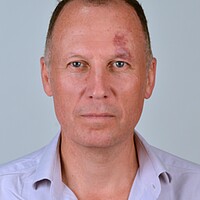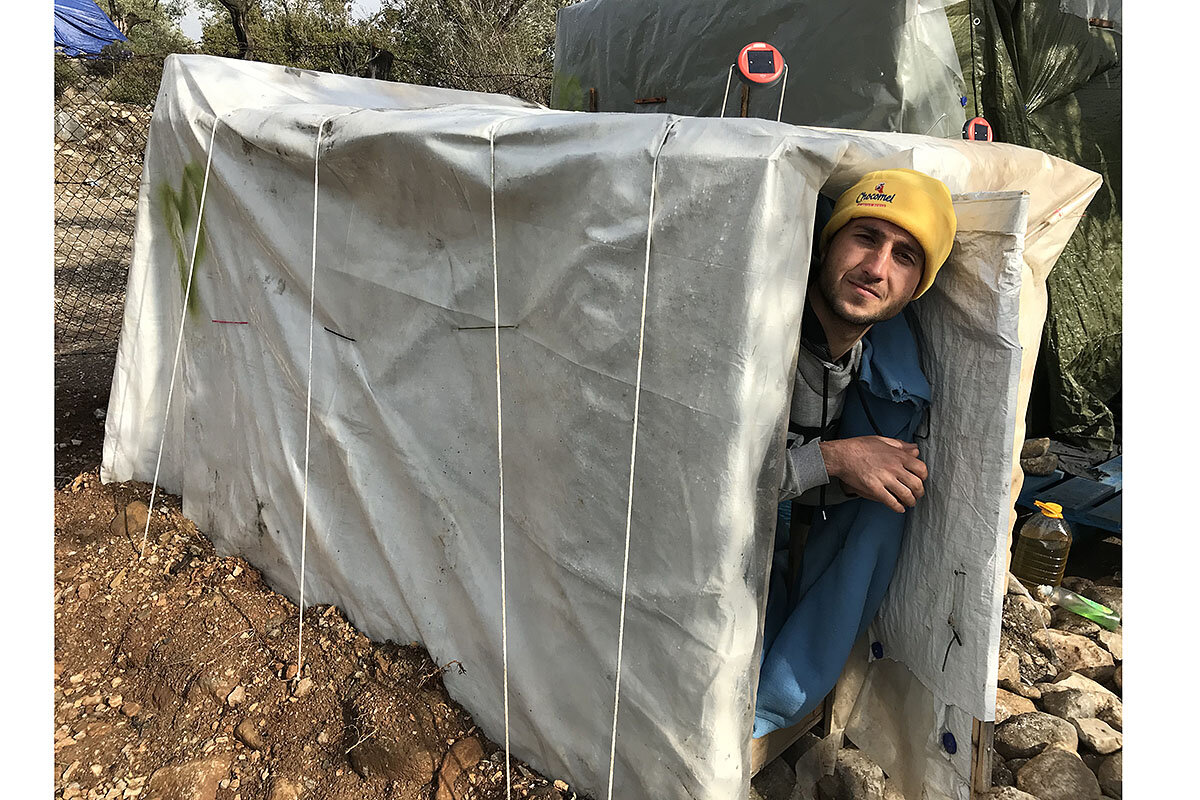Refugee crisis hits home on this overflowing Greek island
Loading...
| Moria camp, Lesbos, Greece
Down a muddy path in Europe’s most notorious refugee camp, there is a tiny shack in which a man behind a makeshift counter sells packets of cookies and crackers.
Next in the row of huts, built from plywood and plastic sheeting, is a small barbershop. Beside that is a bakery where a man crouches in the mud, feeding scraps of wood into a fire for Arabic bread.
These micro-businesses are a testament to how long people have been stuck in Moria camp, on the Aegean island of Lesbos. Some refugees spend a year or more here, where the overcrowding is so severe in the camp itself that families are living in the old olive groves.
Why We Wrote This
How does Greece, still in economic recovery, handle being host to its largest influx of refugees since the peak of the crisis almost five years ago? Our reporter visits a choke point, the island of Lesbos.
All that may be about to change. The new conservative government in Athens, elected last July, has a plan to dramatically speed up the processing of asylum requests, deport failed asylum-seekers back to Turkey, build new camps, and transfer tens of thousands of refugees to the Greek mainland.
Those plans hit a snag this week, however, in the face of opposition from the islanders. The government said it was open to compromise and called on local authorities to propose alternative sites. Mainland protesters themselves have objected to relocations that would move refugees off the islands.
At the very least, the speeding up of asylum applications will benefit people who are judged to be genuine refugees fleeing conflict, rather than those deemed to be economic migrants who are trying to reach Europe in search of a better life.
Among them is Khairullah Sabri, who says he fled fighting and Taliban repression in his native Kunduz province in Afghanistan. Like many of the Afghans in Moria camp, he is from the persecuted Hazara minority. Traveling through Pakistan, Iran, and Turkey, he reached Lesbos with his wife and two small children.
That was six months ago. Like thousands of others, the Sabri family lives in a box-shaped shack covered with plastic sheeting, in the huge overflow area that sprawls across former olive groves.
The original Moria facility, which is enclosed by a wire fence, was designed to hold 2,800 people. There are now close to 20,000; about a third are children. And the United Nations says nearly 2,000 unaccompanied youths are spread across facilities on five Aegean islands.
“It’s very hard for the children,” Mr. Sabri says, as his 2-year-old stomps around in the mud and blows kisses. “They are sick all the time. If you go to the doctor, there is a queue of 300 people.”
Ahmad Samir is from Badakhshan province in Afghanistan. Wearing a red beanie and a gray Nike sweatshirt, he stands outside the wooden hut that he built amid the muddy paths and piles of uncollected garbage. “The situation is really bad here. There’s no help. It’s impossible to live like this,” he says.
Early in February, the U.N. Refugee Agency urged Greece to take emergency measures to alleviate worsening conditions. While the number of refugees leaving their homes and attempting to reach Europe has not approached the peak of 2015 and 2016, nearly 60,000 arrived in Greece in 2019. Most still transit through Turkey, just a few miles across the water.
On Lesbos and the other islands, which host nearly 40,000 migrants and refugees in limbo, the proposed holding facilities are intended to be more hygienic and less crowded. They will be “closed” centers, meaning residents will not be permitted to leave at night.
The rate of transfers is, for the moment, painfully slow. Government promises, made in November, to move 20,000 people from the islands to the mainland have so far come to nothing.
“Hardly anyone has been moved in the last six months,” says Tasos Balis, special adviser to Stratis Kytelis, the mayor of Mytilene, an attractive port town and capital of Lesbos. “The plan is there but there is no implementation. We supported this government but it looks like they can’t keep their promises.”
He is equally unimpressed with a government proposal, announced last month, to install a floating barrier off the coast of Lesbos to deter boats crossing from Turkey. “If people have been through wars and bombardments, a floating barrier is not going to hold them back. They will just cut through it. It’s a joke,” he says.
Deportations of failed asylum-seekers are also moving very slowly. So far this year, just 85 people have been deported back to Turkey – a tiny number, given that smugglers are sending new boatloads across the water every week.
“But it’s a significant number compared to previous months,” says Nickolas Panagiotopoulos of the International Rescue Committee, a humanitarian organization run by a British former foreign secretary, David Miliband. “I think it’s too early to say whether the new fast-track procedure will bear the fruits that the government hopes for,” says Mr. Panagiotopoulos, the IRC’s senior area manager for the islands of Lesbos, Samos, and Chios.
The present government has inherited a backlog of around 90,000 asylum applications.
In the village of Moria, just a few hundred yards from the camp that bears its name, people’s patience has all but run out.
“When the first refugees arrived, we welcomed them with love, especially the Syrian families. But now things have changed,” says Afroditi Deligianni, who says her grocery shop has been broken into six times by refugees.
“Some of them kill our sheep and chickens for food. They take the fruit and chop down trees for firewood. They create a lot of problems for us.”
Tensions on Lesbos are running high. Earlier this month, riot police fired tear gas at a protest march involving 2,000 asylum-seekers, who were calling for better conditions and a faster asylum process.
For the people of Lesbos and the four other islands that host crowded, filthy centers for refugees – Chios, Leros, Samos, and Kos – change cannot come fast enough.
“We’ve become a warehouse for souls. We’ve done our bit for five years. Now we want our lives back,” says Mr. Balis, the mayor’s special adviser.







